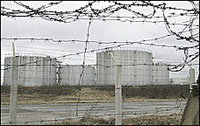Russia-Belarus oil controversy hits Europe supply
Russia halted oil supplies to Germany and Poland via Belarus Monday as an escalating trade feud between Minsk and Moscow renewed Europe's concerns about over-dependence on Russian energy.

Moscow shut off oil flowing through the Friendship pipeline, which runs through Belarus, after Belarus siphoned 79,000 tons of Russian oil, according to Russian officials.
Belarus officials said they diverted Russian oil from the pipeline, but only because Moscow had balked at paying transit fees for permission to use the pipeline.
The dispute put Europe once again in the position of questioning its dependence on Russia for its energy supplies. Last year, in the midst of a row with Ukraine over natural-gas prices, Russia shut down gas to Ukraine, disrupting the flow of gas to several European Union countries farther along the pipeline, the Chicago Tribune reports.
Regardless of the cause, the disruption along the Druzhba, or Friendship, pipeline affected supplies of crude oil headed to Poland, Germany and Ukraine. In the short term, at least, the halt should have a minimal effect, because refineries in those countries maintain reserves. In the longer term as well, the disruption is not as threatening as a shut-off of natural gas, because alternative sources of oil are more readily available.
Still, a prolonged disruption could be worrisome. Oil prices rose on the news, and the dispute rekindled concerns in Europe about the reliability of energy supplies from Russia.
“This shows us once again that arguments among various countries of the former Soviet Union, between suppliers and transit countries, mean that these deliveries are unreliable from our perspective,” Poland’s deputy economics minister, Piotr Naimski, said in televised remarks, according to The Associated Press.
The shutdown of Druzhba, one of the highest-capacity pipelines in the world, took place a week after Russia and Belarus negotiated a last-minute agreement that sharply raised the price Belarus would have to pay for natural gas. The deal came after brinkmanship by each side that raised the specter of disruptions of natural gas deliveries across Europe, like one that followed a dispute between Ukraine and Russia in 2006, the New York Times reports.
Neither Germany nor Poland is in any immediate danger of experiencing oil shortages, as both maintain substantial reserves.
But BBC economics correspondent Andrew Walker says the suspension is an uncomfortable reminder to Europe of the large and growing role that Russia has in meeting its energy needs.
Poland's Deputy Economy Minister, Piotr Nalmski, said his country had enough oil reserves for 80 days, but he attacked the decision to halt exports.
"This shows us once again that arguments among various countries of the former Soviet Union, between suppliers and transit countries, mean that these deliveries are unreliable," he told the BBC.
Last year deliveries of Russian natural gas to much of Western Europe were disrupted during a dispute over pricing between Russia and Ukraine.
The European Union is set to discuss energy supply issues as part of a meeting on climate change and energy policy scheduled for Wednesday.
Source: agencies
Prepared by Alexander Timoshik
Pravda.ru
Subscribe to Pravda.Ru Telegram channel, Facebook, RSS!




